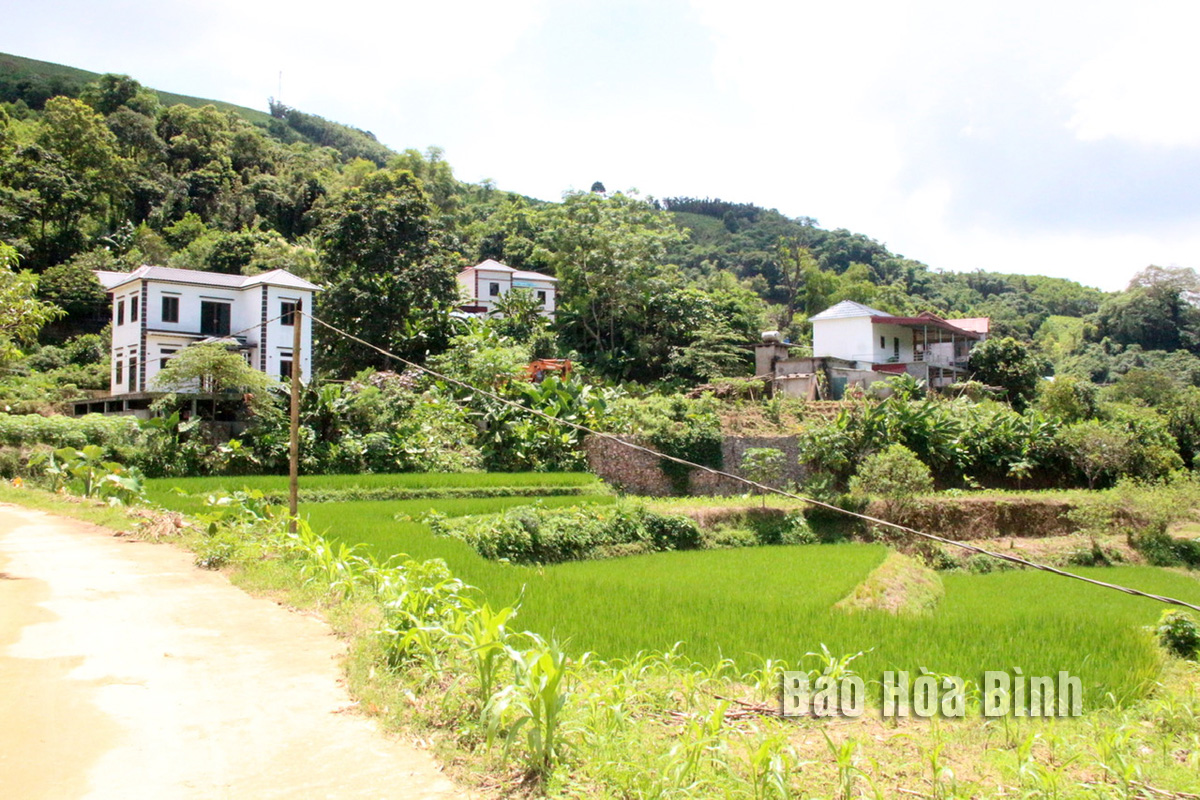
Forty years ago, while searching for a new site for settlement of their Dao ethnic community, a group of young men, including Trieu Luc Tin stumbled upon a small valley in Ba Ra village. Boasting fertile land and abundant water sources, this area was also a place where many birds chose to nest. Without hesitation, these men traversed the forest to bring their families to settle their life there. From an abandoned land, Ba Ra has now become a prosperous and peaceful village in Hung Tien commune, Kim Boi district.
Thanks to bold investments and economic development initiatives, all households in Ba Ra village have permanent homes.
Tin recalled that he once trekked alone, crossing streams and forests to reach the top of Ba Ra mountain when there were no roads leading there. Back then, reaching Ba Ra was a challenge but it was even harder to meet local residents, as houses were built far apart from each other. According to Tin, although the land on Ba Ra was fertile and more conducive to agriculture than where he and other Dao villagers previously lived, at that time, the Dao community was still trapped in a nomadic lifestyle, making life difficult.
In the memories of Trieu Thi Luong, another local resident, the hardships of settling in this land remain vivid after many years. "In those days, foraging in the forest to find food for the family was a difficult journey”, she recalls.
"When corn was not yet in season and cassava had not rooted, we had to walk through thorny bushes despite our feet bleeding in order to gather wild vegetables and roots just to survive,” she added.
According to Bach Thi Minh Hue, Deputy Secretary of Hung Son commune's Party Committee, Ba Ra has gradually emerged from being an extremely disadvantaged village to becoming one of the prosperous villages in the commune. Ly Sinh The, head of the village, noted that although 100% of the villagers are ethnic Dao people, all 93 households in the village now have brick houses thanks to the government's investment and support in terms of infrastructure like roads and electricity. The living standards of local residents have also been improved.
He attributed the changes to the fact that the ethnic Dao people in Ba Ra dared to change their mindset and be proactive in learning production experiences and restructure their crop and livestock to suit local conditions. According to the village chief, besides the 190 hectares of both residential and agricultural land, locals have bravely invested in leasing hundreds of hectares in other areas for sustainable forestry, thus bringing significant income for them each year. Taking advantage of the locality’s natural resources, villagers invest in animal husbandry, particularly in raising indigenous pigs. All local households engage in pig farming, earning tens to hundreds of millions of Vietnamese dong annually.
In addition to livestock farming, Ba Ra residents also earn income from forestry. The average income per person in the village now exceeds 35 million VND (1,421 USD) a year. Many families have been able to purchase expensive vehicles for transportation and business. Currently, the village boasts over ten trucks used for transporting goods and materials. Now, there are only 21 out of 93 households classified as poor under the multidimensional poverty standard.
As people’s living conditions improve, education in Ba Ra has also received more attention. According to The, currently, 100% of school-aged children in the village attend school. Notably, with a strong desire for education, six children from Ba Ra are enrolled in college and university. This progress highlights the transformation of the village which was once the poorest area in Muong Dong region.
Playing a key role in Hoa Binh province’s economic development, Luong Son district has been focusing on science and technology development, innovation, and digital transformation.
Identifying the application of online public services as a key step in administrative procedure reform and e-government building, Kim Boi district has proactively provided services and supported residents and businesses in accessing and utilising full-process online public services promptly and efficiently. The locality aims to lift the rate of end-to-end online public services to over 90%, with all officials and civil servants handling tasks in the digital environment.
Nguyen Anh Tuyet, hailing from a family steeped in the ancient art of herbal medicine, is transforming local medicinal herbs into high-value concentrated extracts, elevating their worth and healing potential.
Nguyen Phi Long, an alternate member of the Party Central Committee, Secretary of the Hoa Binh provincial Party Committee, and head of the steering committee for the province's key projects, chaired a conference on March 25 to discuss measures for implementing the project on constructing the Hoa Lac - Hoa Binh road and upgrading the Xuan Mai - Hoa Binh section of National Highway 6 under the public-private partnership (PPP) model.
Administrative reform has been identified as a key priority in enhancing state governance, improving the business environment, and facilitating services for citizens and enterprises.
The Standing Board of the Hoa Binh provincial Party Committee met on March 18 to review and guide major investment projects aimed at boosting local socio-economic development.



